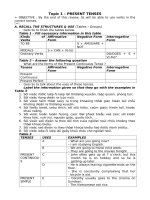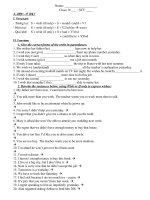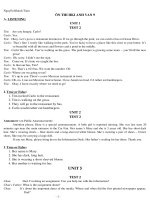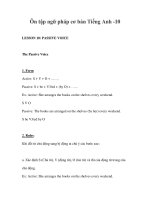on tap ngu phap cap II vao lop 10
Bạn đang xem bản rút gọn của tài liệu. Xem và tải ngay bản đầy đủ của tài liệu tại đây (131.04 KB, 11 trang )
A. WISH IF ONLY
I. Structure:
- Tửụng lai: S + wish (if only) + S + would/ could + V1
- Hieọn taùi: S + wish (if only) + S + V2/ed (be were)
- Quaự khửự S + wish (if only) + S + had + V3/ed
+ could have + V3/ed
II. Exercises:
1. Give the correct forms of the verbs in parentheses:
1. She wishes her father (be) _______________ here now to help her.
2. I wish you (not give) ____________________ them my phone number yesterday.
3. I wish they (visit) _______________ us when they were in town.
4. I wish someone (give) _______________ me a job next month.
5. If only I (can take) ____________________ the trip to Hanoi with her next summer.
6. We wish we (understand) ____________________ all the teachers explanation yesterday.
7. He missed an exciting football match on TV last night. He wishes he (watch) _______________ it.
8. If only I (have) _______________ more time to do this job.
9. I wish she (come) _______________ to see me yesterday.
10. I wish that someday I (be) _______________ able to marry her.
2. Rewrite the sentences below, using Wish or If only to express wishes:
1. My father isnt here now. I want him to be here now.
2. You talk more than you work. The teacher wants you to work more than to talk.
3. John would like to be an astronaut when he grows up.
4. Im sorry I didnt help you yesterday.
5. I regret that you didnt give me a chance to tell you the truth.
6. Mary is afraid she wont be able to attend your wedding next week.
7. We regret that we didnt have enough money to buy that house.
8. You drive too fast. Id like you to drive more slowly.
9. You are too lazy. The teacher wants you to be more studious.
10. Im afraid he wont get over his illness soon.
11. Im not a doctor.
12. I havent enough money to buy this book.
13. I live in a big city, but I dont like it.
14. Nam is sorry now that he didnt accept the job.
15. Tomorrow is a workday.
16. We have to work this Saturday.
17. I feel sick because I ate too much ice - cream.
18. Its pity that you werent here last week.
Name: ____________________
Class: 9/ ___ - STT: ____
19. I regret speaking to him so impolitely yesterday.
20. Alan regretted asking Arthur to lend him 20$.
21. I want the baby to stop crying.
22. He is sorry now that he didn’t invite Molly to his party.
23. The hotel wasn’t good.
24. I didn’t understand the lesson.
25. My friend didn’t pass his exam.
B. ENOUGH
I. Structure:
- S + be + Adj + enough (+ for + O) + to V1
- S + V + Adv + enough (+ for + O) + to V1
II. Exercises:
Rewrite the sentences below, using Enough instead of Too:
1. He is too old to wear this colored shirt.
2. She is too weak to carry this bag.
3. This pen is too expensive for me to buy.
4. Bill is too foolish to understand what I say.
5. This bag is too heavy for her to carry.
6. The test was too difficult for them to do.
7. That sentence was too long for me to memorize.
8. The land is too fertile to grow crops.
9. The room is too noisy for us to study.
10. This book is too dull to read.
11. We were too late to get good seats.
12. Jack is too lazy to make progress in his study.
13. I’m too poor to help you with the money.
14. These oranges are too sour for us to eat.
15. The shelf is too high for the boy to reach.
16. This road is too dangerous for her to go at night.
17. The water in this pool is too dirty to drink.
18. Martha is too ugly to have a boyfriend.
19. This room is too dark for us to study.
20. He studied too badly to pass his exam.
C. BECAUSE – BECAUSE OF
I. Structure:
- … because of + N/ N phrase/ Gerund Phrase
- Because/ Since/ As + S + V
II. Exercises:
1. Supply either Because or Because of as appropriate:
1. It was difficult to deliver the letter _______________ the sender had written the wrong address
on the envelope.
2. We decided to leave early _______________ the party was boring.
3. Rescue attempts were temporarily halted _______________ the bad wealth.
4. Paul may not go to the football game _______________ his grades.
5. They visited their friends often _______________ they enjoyed their company.
2. Change clause of reason to phrase:
1. The teacher is sick. We’ll have no class tomorrow.
2. She walked slowly. Her leg was injured.
3. Mary looks happy. She has just got good marks.
4. He came to the office 10 minutes late. He missed the first bus.
5. She coughed and sneezed. The doctor said she had to stay out of crowd.
6. I didn’t come in time. There was a traffic jam.
7. He stayed at home yesterday. His mother was sick.
8. We didn’t want to go out. It rained heavily.
9. It’s raining, so we stay at home.
10. Most people hear jogging is a good exercise, so they begin to jog.
11. The climate in the country is healthy, so people like to live there.
12. A computer can be used for various purposes, so it becomes very popular nowadays.
13. Tomorrow is public holiday, so all shops will be shut.
14. Mary didn’t go to school yesterday because she was sick.
15. She went to bed early because she felt tired.
16. Ann didn’t go to the circus with Betty because she had a bad cold.
17. I couldn’t do the test because it was difficult.
18. I couldn’t read the letter because it was dark.
19. He came late because it rained heavily.
20. I can’t study because it is noisy.
21. The train came late because it was foggy.
22. All the teacher loves him because his conduct is good.
23. The train was late because the fog was thick.
24. We stopped our car because the traffic lights turned red.
25. The planed couldn’t take off because the climate is warm and damp.
26. He couldn’t drive fast because the street was crowded and narrow.
27. I can’t sleep because the weather is hot.
28. He left school because his life was hard.
D. SO SAÙNH
I. Structure:
- Baèng: S + V + as + Adj (Adv) + as + N (pronoun)
S + V + the same (+ N) + as + N (pronoun)
- Không bằng:
+ Thêm “-er” vào tính từ (trạng từ) có một – hai âm tiết (short)
+ Thêm “more” vào tính từ (trạng từ) có ba âm tiết trở lên. (long)
+ short Adj (Adv) + er
S + V + more + long Adj (Adv) + than + N (pronoun)
less + Adj (Adv)
- Bậc nhất:
+ Thêm “-est” vào tính từ (trạng từ) có một – hai âm tiết (short)
+ Thêm “most” vào tính từ (trạng từ) có ba âm tiết trở lên. (long)
+ short Adj (Adv) + est in + Nsít (đếm được)
S + V + most + long Adj (Adv) + of + Nsn` (đếm được)
least Adj (Adv)
II. Exercises:
1. Yesterday the temperature was nine degrees. Today it’s only six degrees.
It’s
2. The journey takes four hours by car and five hours by train.
It takes
3. Chris and Joe both did badly in the exam. Chris got 20% but Joe only got 15%.
Joe did
4. I expected my friends to arrive at about 4 o’clock. In fact they arrived at 2.30.
My friend
5. We were very busy at work today. We are not as busy as that everyday.
We
6. Jane cooks better than her sister. Jane’s sister
7. Tom is the best football player in this team.
Nobody in this team
8. Nothing is faster than the speed of light. The speed of light
9. Jack is younger than he looks. Jack isn’t
10. I didn’t spend as much many as you. You
E. REPORTED SPEECH
I. Structure:
Trực tiếp Gián tiếp
1. HT đơn (I walk)
2. HT tiếp diễn (I am walking)
3. QK đơn (I walked)
4. QK tiếp diễn (I was walking)
5. HT hoàn thành (I have walked)
6. HT hoàn thành t. diễn (I have been walking)
7. QK hoàn thành (I had walked)
8. QK hoàn thành t. diễn (I had been walking)
QK đơn (I walked)
QK tiếp diễn (I was walking)
QK đơn (I walked)
QK hoàn thành (I had walked)
QK tiếp diễn (I was walking)
QK hoàn thành t. diễn (I had been walking)
QK hoàn thành (I had walked)
QK hoàn thành t. diễn (I had been walking)
QK hoàn thành (I had walked)
QK hoàn thành t. diễn (I had been walking)
1. This
2. These
3. Here
4. Now
5. Today
6. Yesterday
7. Tomorrow
8. Ago
9. Next …
That
Those
There
Then
That day
The day before
The previous day
The day after
The following day
Before
The following …
The … after
- must had to/ would have to
- must not was not to (were not to)
- can could/ be able to
- will /shall would/ should/ be going to
1. S + said to + O (+ that) + S + V + O
told
said
2. asked + O
S + wondered + Wh-word (if/ whether)+ S + V + O
wanted to know
3. S + told/ asked/ ordered/ forced/ advised/ begged/ invited + O (+ not) + to V1
II. Exercises:
1. “You are my friend.” He said
2. “I don’t know how to do this exercise.” Johnny said
3. “Don’t come back before 1 o’clock”. My brother advised
4. “Cook it in butter”. Mrs. Brown told
5. “Teacher, give us better marks, please.” The pupils asked
6. “Put as hard as you can.” She told me
7. “Who put salt in my coffee?” He asked
8. “Are you going to eave tomorrow?” My friend asked
9. “Have you done your homework?” I asked
10. “What time did you go to bed last night?”My mother asked
11. “I must go home now.”I asked
12. “We are waiting for the school bus.” The children said
13. “My father died a year ago.”Mary said
14. “Must you go now?”Mr. Brown asked
15. “Whose bicycle did you borrow yesterday?” His mother asked
16. “It isn’t so foggy today as it was yesterday?”The teacher said
17. “Shut the door but don’t lock it.”She told
18. “New York is bigger than London.”Tom said
19. “Please help us.”They begged
20. “Don’t forget to send your parents y regards.”She told
21. “How long does it take to get to London?’The traveler asked
22. “I have finished studying my lesson.”John said
23. “I can’t go to the movies with you, John.”Mary said









